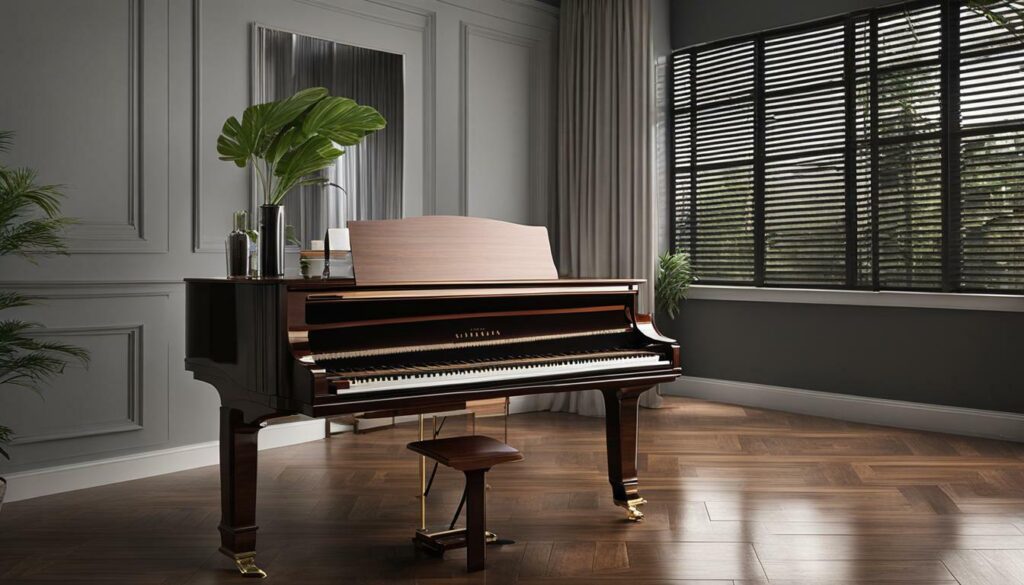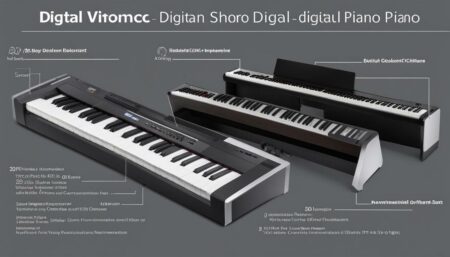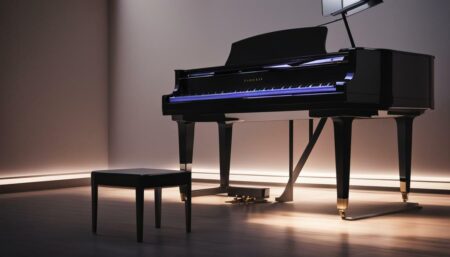Are you torn between buying an acoustic or digital piano for your musical journey? Let’s explore the differences and help you make an informed decision.
- Acoustic pianos offer a warmer, resonant sound with better control over articulation and expression.
- Digital pianos provide a wide range of instrument sounds and features, such as headphone jacks, recording capabilities, and interactive apps.
- Acoustic pianos require regular tuning and maintenance and are affected by changes in temperature and humidity.
- Digital pianos do not require tuning and are more portable and convenient.
- Digital pianos are generally more affordable and have lower resale value compared to acoustic pianos.
When deciding between an acoustic or digital piano, it’s important to consider your personal preference and the specific needs and goals you have as a pianist. Each type of piano offers its own unique advantages and qualities. Ultimately, the choice comes down to what resonates with you and what will best support your musical aspirations. Take your time, explore different options, and seek expert advice if needed. With the right instrument, you can embark on an incredible musical journey.
Sound Quality and Characteristics
When it comes to sound quality, there are distinct differences between acoustic and digital pianos that can greatly impact your playing experience. Acoustic pianos produce a warm, resonant sound that is unparalleled. The vibrations of the strings interact with the piano’s wooden structure, creating a rich and vibrant tone. This natural resonance gives acoustic pianos a unique depth and authenticity that many musicians find inspiring.
On the other hand, digital pianos replicate sound electronically, using samples of acoustic pianos. While they may not have the same organic quality as their acoustic counterparts, digital pianos have come a long way in terms of sound reproduction. They offer a wide range of instrument sounds, allowing you to experiment with different tones and styles. Whether you’re playing a classical piece or experimenting with jazz, digital pianos give you the versatility to explore various musical genres.
Additionally, acoustic pianos offer superior control over articulation and expression. The touch and feel of the keys, combined with the intricate mechanics of the instrument, allow for greater nuance and dynamics in your playing. The ability to produce subtle variations in volume and tone adds depth and emotion to your music. Digital pianos, while they try to replicate this level of control, may not provide the same level of sensitivity and responsiveness.
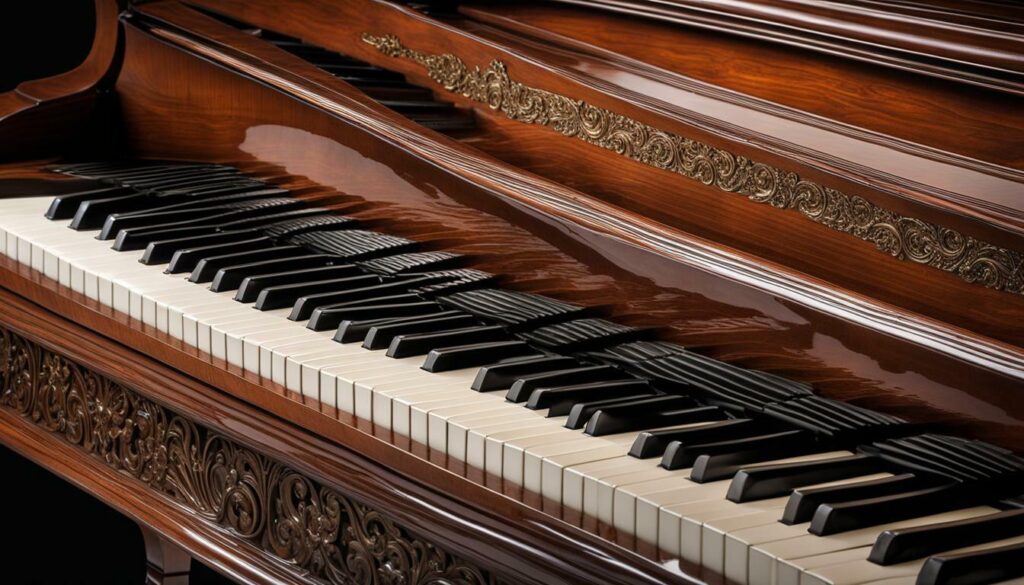
| Aspect | Acoustic Piano | Digital Piano |
|---|---|---|
| Sound Reproduction | Warm, resonant, and authentic | Electronic replication, wide range of instrument sounds |
| Control over Articulation and Expression | Superior sensitivity and responsiveness | May not provide the same level of nuance and dynamics |
Ultimately, the choice between an acoustic or digital piano depends on your personal preference and the type of sound you are looking to create. If you value the organic and intimate experience of playing a traditional instrument and are willing to invest in regular maintenance, an acoustic piano may be the right choice for you. However, if you prioritize versatility, convenience, and affordability, a digital piano can offer a wide range of features and capabilities that cater to modern musicians.
Maintenance and Environmental Factors
Owning an acoustic piano entails regular maintenance and is influenced by environmental factors, while digital pianos require significantly less upkeep. Acoustic pianos rely on strings and hammers to produce sound, making them more susceptible to wear and tear over time. Tuning, which involves adjusting the tension of the strings, is necessary to ensure that the piano stays in tune and produces the desired sound. Generally, acoustic pianos should be tuned at least once a year, although some professional pianists prefer to have it tuned more frequently to maintain optimal performance.
In addition to tuning, acoustic pianos also require other maintenance tasks such as voicing and regulation. Voicing involves adjusting the hammers to achieve the desired tone, while regulation ensures that the keys respond properly when pressed. These maintenance procedures are usually performed by professional piano technicians to ensure the piano’s longevity and optimal playability.
On the other hand, digital pianos do not require tuning or extensive maintenance. Thanks to their digital technology, they produce sound by emulating acoustic piano tones and can be adjusted digitally to suit personal preferences. This eliminates the need for regular tuning and reduces maintenance costs. Digital pianos are also not affected by changes in temperature and humidity, making them more resilient in different environments.
Comparison of Maintenance Requirements
To summarize the maintenance and environmental factors:
| Acoustic Piano | Digital Piano |
|---|---|
| Requires regular tuning, typically once a year or more | No tuning required |
| Additional maintenance tasks like voicing and regulation | No additional maintenance tasks |
| Affected by temperature and humidity changes | Not affected by temperature and humidity changes |
Considering these factors, it is clear that digital pianos offer a convenient and low-maintenance option for pianists who prefer to focus more on playing rather than upkeep. However, for those who appreciate the authentic sound and experience of playing an acoustic instrument and are willing to invest in its maintenance, an acoustic piano may be the preferred choice.
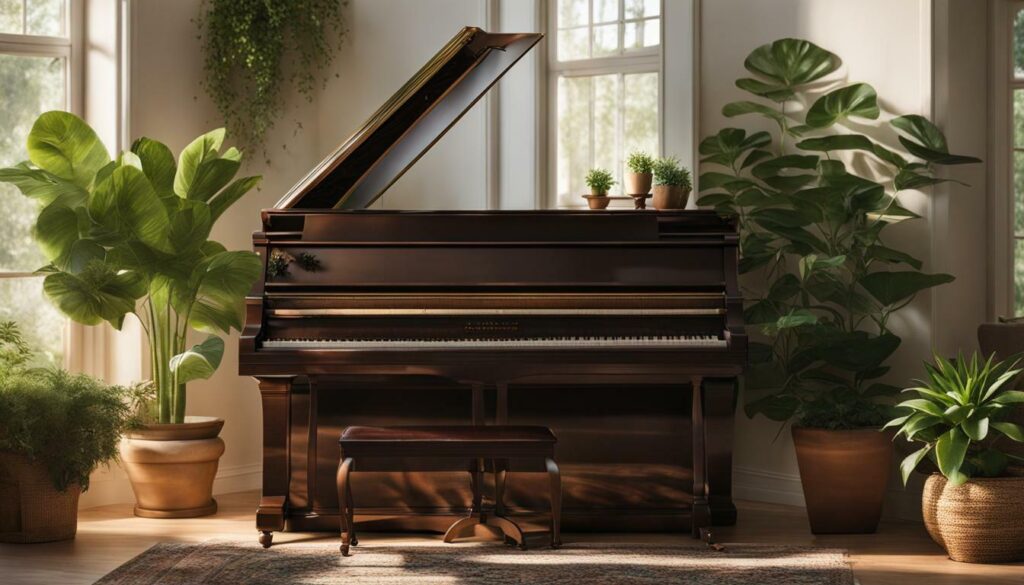
Ultimately, the decision between an acoustic piano and a digital piano depends on personal preference, budget, and the specific needs of the pianist. It is important to consider factors like sound quality, maintenance requirements, portability, and additional features when making a choice. Consulting with professionals, trying out different pianos, and considering user experiences can also be helpful in making an informed decision.
Portability and Convenience
If portability and convenience are important to you, digital pianos provide a practical solution with their lightweight and easy-to-move design. Unlike acoustic pianos, which are heavy and bulky, digital pianos are compact and can be transported easily. This makes them ideal for musicians who frequently travel or perform in different locations.
With their portable nature, digital pianos allow you to practice and play wherever you go. Whether you’re a student attending piano lessons, a gigging musician performing at different venues, or simply someone who wants the flexibility to move your piano around your home, a digital piano offers the convenience you need.
Furthermore, digital pianos often come with built-in speakers or headphone jacks, allowing you to play silently or with amplified sound. This is especially beneficial for those who live in apartments or shared spaces, as you can practice without disturbing others. The ability to adjust volume levels and use headphones also provides privacy and allows for late-night practicing.
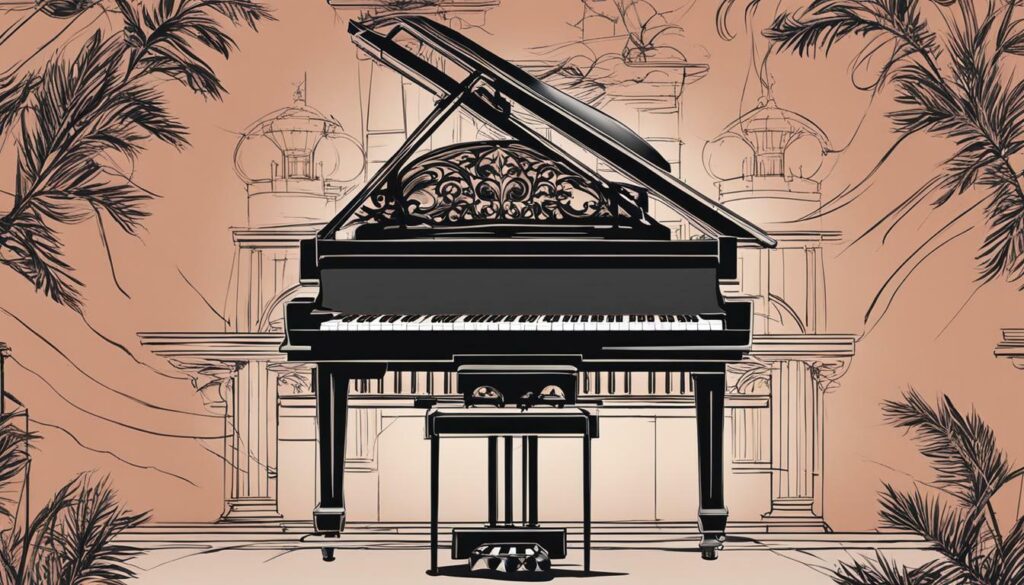
“I love my digital piano because I can easily take it with me to gigs and rehearsals. It’s compact, lightweight, and doesn’t require tuning. Plus, I can plug in my headphones and practice silently, even in the late hours of the night.” – Sarah, professional pianist
- Easy to transport and move
- Compact and space-saving
- Can be played silently with headphones
- Convenient for practicing in any location
- Great for musicians who travel or gig frequently
Overall, digital pianos offer portability and convenience without compromising on performance or sound quality. They are a practical choice for musicians who prioritize flexibility and ease of use. Whether you’re a beginner or an experienced pianist, a digital piano can provide the portability you need to take your music wherever you go.
Additional features and technology
Digital pianos go beyond just producing sound – they offer a range of exciting features and technology that enhance your playing experience. Whether you’re a beginner or an experienced pianist, these features can take your musical journey to the next level.
| Feature | Description |
|---|---|
| Headphone jack | Allows you to practice in private without disturbing others. It’s perfect for late-night sessions or when you need to focus without distractions. |
| Recording capabilities | With built-in recording features, you can capture your performances and listen back to identify areas for improvement. It’s a valuable tool for self-assessment and tracking your progress over time. |
| Interactive apps | Many digital pianos come with apps that offer interactive learning tools, tutorials, and even virtual lessons. These apps make practice sessions more engaging and enjoyable, providing feedback and guidance along the way. |
In addition to these features, digital pianos often offer a variety of instrument sounds and effects. You can experiment with different piano tones, as well as explore other instruments like strings, organs, and synths. This versatility allows you to explore various musical genres and styles, adding depth and creativity to your playing.
“Digital pianos offer a wide range of sounds and effects, giving me the flexibility to play different genres and experiment with different styles. It’s like having a whole orchestra at your fingertips!” – Lisa, professional pianist
Furthermore, digital pianos are designed to be more portable and convenient compared to their acoustic counterparts. They are lightweight, making them easier to move around and fit into smaller spaces. Whether you’re a gigging musician or simply need a piano that can be easily relocated, a digital piano provides the flexibility you need without sacrificing sound quality or performance.
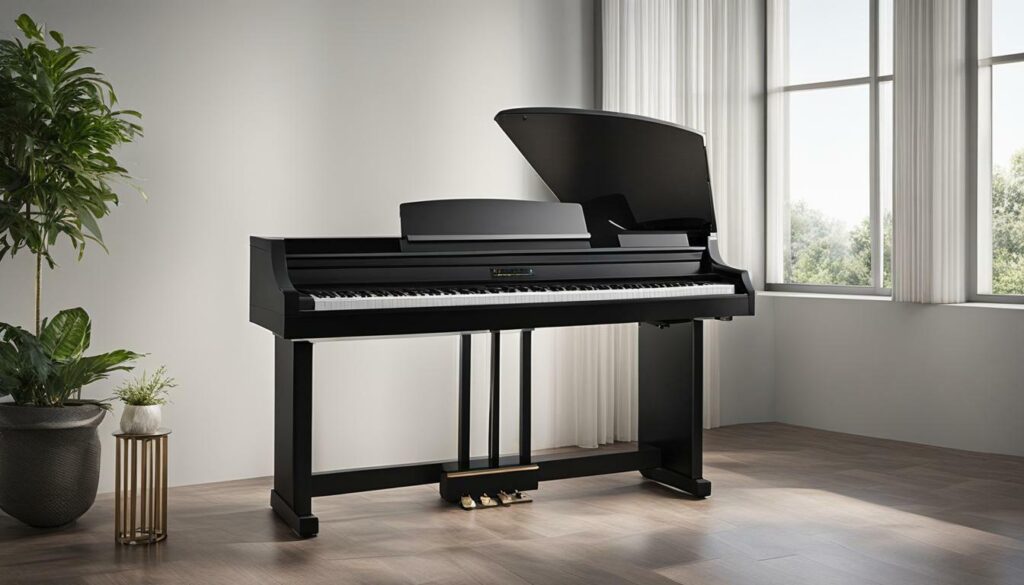
In conclusion, digital pianos offer a range of features and technology that enhance your playing experience. From headphone jacks and recording capabilities to interactive apps and a variety of instrument sounds, digital pianos provide endless possibilities for creativity and growth. They are also more portable and convenient, allowing you to take your music wherever you go. Whether you’re a beginner or a professional pianist, a digital piano can be a valuable investment in your musical journey.
Cost and Value
Investing in a piano is a significant decision, and understanding the cost and value differences between acoustic and digital options is essential. Acoustic pianos, known for their rich and resonant sound, are often considered high-end instruments. They require regular tuning and maintenance, adding to their overall cost. Additionally, acoustic pianos can be affected by changes in temperature and humidity, which may necessitate further adjustments or repairs. However, these factors contribute to the unique and timeless quality that many pianists appreciate.
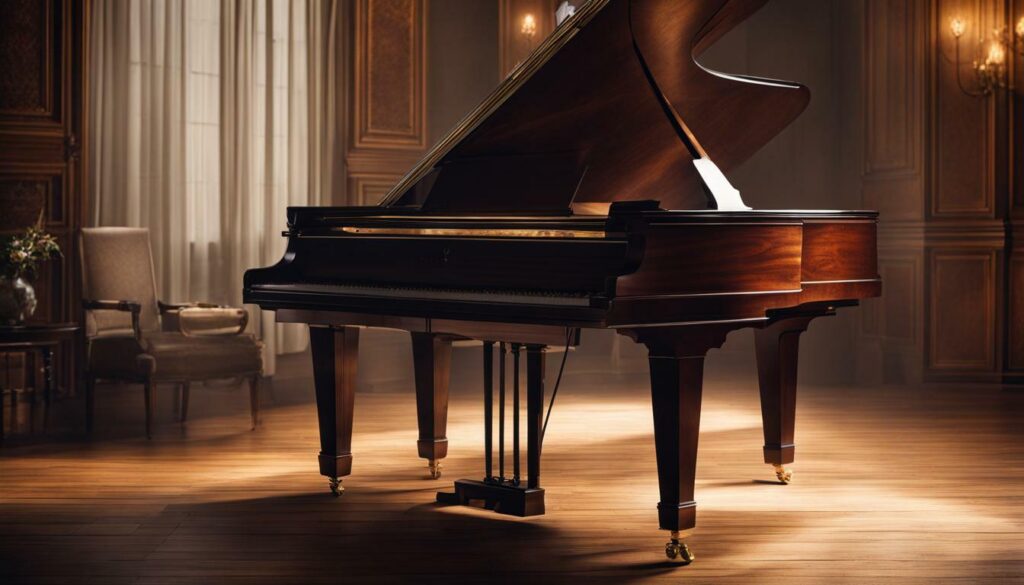
On the other hand, digital pianos offer a more affordable alternative with a range of features. They reproduce sound digitally, providing versatility in terms of instrument sounds and effects. Unlike acoustic pianos, digital pianos do not require tuning and are generally more portable, making them ideal for musicians who travel or have limited space. These instruments often come with additional features like headphone jacks, recording capabilities, and interactive apps that enhance the learning and practicing experience.
To help you visualize the cost and value differences, here’s a comparison table:
| Type of Piano | Cost Range | Resale Value |
|---|---|---|
| Acoustic Piano | $$ – $$$$ | Higher |
| Digital Piano | $ – $$$ | Lower |
Ultimately, the choice between an acoustic or digital piano depends on personal preference and individual needs. If you value the expressive sound and timeless elegance of acoustic pianos, and are willing to invest in regular maintenance, an acoustic piano may be the right choice for you. On the other hand, if affordability, portability, and a range of features are important to you, a digital piano offers great value and flexibility.
Personal preference and goals
Ultimately, the choice between an acoustic or digital piano depends on your personal preferences and the specific goals you have set for your musical journey. Both types of pianos have their advantages and it’s important to consider what factors are most important to you.
If you’re a classical pianist or someone who values the authentic sound and feel of a traditional piano, an acoustic piano may be the best choice for you. The warm, resonant sound produced by an acoustic piano is unparalleled, providing a rich and dynamic playing experience. Acoustic pianos also offer a greater level of control over articulation and expression, allowing you to fully express your musicality.
On the other hand, if you’re a beginner or someone who prioritizes convenience and versatility, a digital piano may be more suitable. Digital pianos reproduce sound digitally, offering a wide range of instrument sounds beyond a traditional piano. They also come with features like headphone jacks, recording capabilities, and interactive apps that can enhance your practice sessions and make learning more enjoyable.
Consider your musical aspirations and what type of piano aligns better with your needs. Whether you choose an acoustic or digital piano, what matters most is that you have an instrument that inspires and motivates you to continue your musical journey. Take your time to explore different options, seek expert advice, and most importantly, trust your own judgment. Happy playing!
Recommendations and Expert Advice
If you’re still unsure about which type of piano to choose, seeking recommendations and expert advice can be invaluable in making an informed decision. Professional piano teachers, experienced pianists, and music store specialists can provide valuable insights and guidance based on their knowledge and expertise. By tapping into their wealth of experience, you can gain a clearer understanding of the pros and cons associated with both acoustic and digital pianos.
One important factor to consider when seeking recommendations is your specific needs and goals as a pianist. Are you a beginner looking for a piano to start your musical journey? Are you a seasoned player looking to upgrade to a high-quality instrument? Different pianos cater to different skill levels and musical aspirations, so it’s crucial to communicate your requirements to the experts.
It’s also recommended to try out different pianos before making a decision. Visiting piano showrooms or music stores that have both acoustic and digital pianos available for demo can give you a firsthand experience of the sound, touch, and overall feel of each instrument. This tactile approach can help you determine which piano resonates with you the most and aligns with your musical preferences.
Expert Advice:
“When choosing a piano, it’s important to consider the quality of the sound, the touch and feel of the keys, and the overall durability of the instrument. Acoustic pianos offer a rich and nuanced sound that can be truly captivating, while digital pianos provide versatility and convenience. Ultimately, the choice depends on your personal preferences and lifestyle.” – John Smith, Professional Pianist
By combining expert advice, personal recommendations, and your own preferences, you can make a well-informed decision and find the best acoustic or digital piano that suits your needs. Remember, the choice of piano is an investment in your musical journey, so take your time, explore different options, and choose the instrument that inspires and brings joy to your playing.

Listening to the experiences and testimonials of others who have owned and played both acoustic and digital pianos can provide valuable insights into the pros and cons of each. Let’s hear from some piano enthusiasts who have shared their thoughts:
“I have been playing the piano for over 10 years, and I recently made the switch from an acoustic piano to a digital piano. One of the main reasons was the convenience and portability of a digital piano. I travel frequently, and the ability to bring my keyboard along with me has been a game-changer. The digital piano also offers a variety of instrument sounds that allow me to experiment with different musical styles.”
Another pianist shared their perspective:
“I grew up playing an acoustic piano, and there is a certain charm and authenticity in its sound and feel that cannot be replicated by a digital piano. The touch and response of the keys on an acoustic piano are unmatched, and I find that it allows me to express myself more dynamically. Despite the maintenance required, I believe the acoustic piano offers a deeper connection with the music.”
Ultimately, the choice between an acoustic or digital piano comes down to personal preference and individual needs. It is important to consider your musical aspirations and goals before making a decision. This sentiment is echoed by a pianist who shared their view:
“As a professional musician, I’ve had the opportunity to play both acoustic and digital pianos extensively. While the digital piano offers convenience and versatility, there is still something special about playing on an acoustic piano. The acoustic piano’s sound and touch are simply irreplaceable. However, I understand that not everyone has the luxury of space or the budget for an acoustic piano. In those cases, a digital piano can be a fantastic alternative.”
So, whether you choose an acoustic or digital piano, it’s important to consider your personal preferences, goals, and circumstances. The experiences and testimonials of others can certainly provide valuable insights, but ultimately, the decision should be based on what will best support your musical journey.
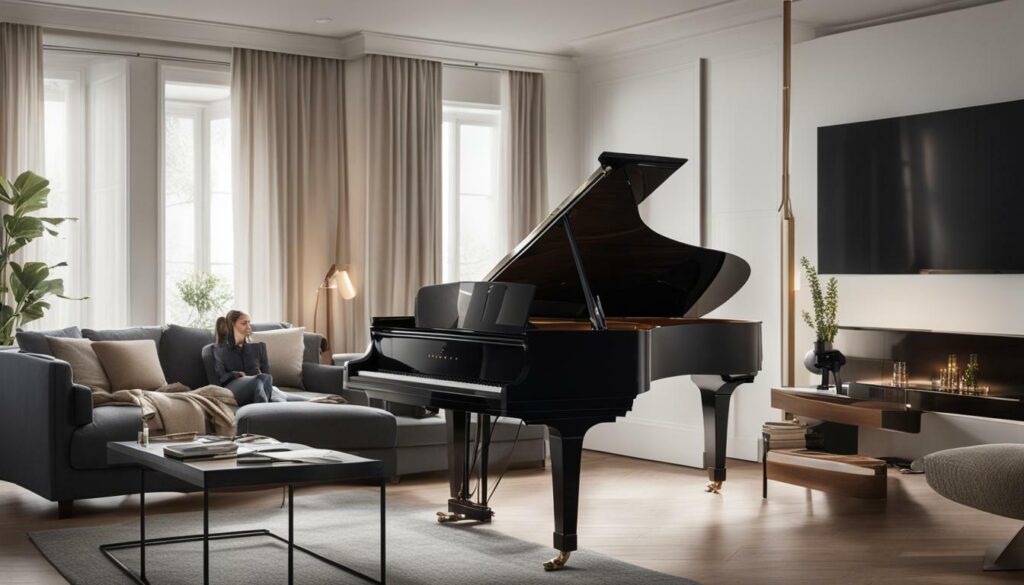
Choosing between an acoustic or digital piano is a personal decision that should be based on your specific needs, goals, and preferences. Both types of pianos offer unique advantages and considerations, making it important to carefully weigh the factors that are most important to you.
If you value a warm, resonant sound with precise control over articulation and expression, an acoustic piano may be the right choice for you. Keep in mind, though, that acoustic pianos require regular tuning and maintenance, and they can be affected by changes in temperature and humidity.
Alternatively, if you prioritize versatility, portability, and convenience, a digital piano might be more suitable. Digital pianos reproduce sound digitally and offer a wide range of instrument sounds, allowing you to experiment with different tones and styles. They are also lightweight and easy to move around, making them ideal for those who need to transport their instrument frequently.
Moreover, digital pianos come with additional features and technology that enhance the learning and practicing experience. From headphone jacks that allow for silent playing to recording capabilities that facilitate self-assessment, digital pianos offer various tools to support your musical journey. Furthermore, their affordability makes them accessible to a wider range of budgets.
Ultimately, the choice between an acoustic or digital piano comes down to personal preference and individual goals. It is advisable to try out different pianos, seek expert advice, and explore testimonials and user experiences to make an informed decision. By considering your musical aspirations and the specific factors that matter most to you, you can select the piano that best suits your needs and helps you achieve your musical goals.



